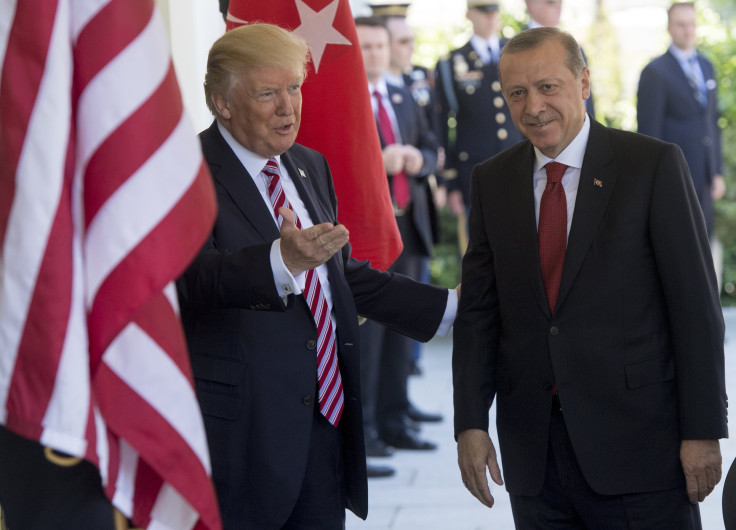US-Turkey Tensions Explained: What Caused The Latest Diplomatic Spat

In a sharp escalation in the diplomatic spat between the two countries, the United States and Turkey mutually suspended non-immigrant visa services Sunday, days after a U.S. consulate employee was arrested in Turkey.
A statement from U.S. mission to Turkey, read “all non-immigrant visa services at all U.S. diplomatic services in Turkey” were suspended. The U.S. government, in its statement, further insisted the decision was taken in the wake of “recent events.”
Statement from the U.S. Mission to Turkey pic.twitter.com/RjTU3BfSXZ
— U.S. Embassy Turkey (@USEmbassyTurkey) October 8, 2017
In a tit-for-tat move, Ankara used a similar choice of words taking a hit at the U.S. and said it aimed to restrict the number of visitors from the U.S. to diplomatic and consular missions following “recent events.”
Statement from the Turkish Mission to the U.S., October 8, 2017 pic.twitter.com/4i0BwInOCj
— Turkish Embassy DC (@TurkishEmbassy) October 8, 2017
The suspension of visas sparked concern among social media users, with some noticing how Turkey just “copy-pasted” the U.S. statement.
I am traveling to Istanbul this week on October 11 we were planing to get the visa at the airport as usual .
— Love Homs (@nadaajam) October 9, 2017
Tensions have flared between the two countries since the July 2016 coup bid in Turkey, which was blamed by Turkey President Recep Tayyip Erdoğan on U.S.-based Muslim cleric Fethullah Gulen.
During Erdogan’s visit to Washington D.C. in May, clashes were reported between his bodyguards and demonstrators outside the Turkish ambassador's residence. The protesters carrying the flag of Kurdish Democratic Union Party were said to be agitating against Erdogan’s policies in Syria and Iraq. It was during the same visit that Erdogan met President Donald Trump and called arming of Syrian Kurdish militia YPG, an acronym for People’s Protection Units — considered as a terrorist organization by Turkey — by the U.S as “unacceptable.”
Later, in September, the indictment of former Turkish economy minister Mehmet Zafer Caglayan by U.S. prosecutors also dented the relations between the two countries.
He was accused of “conspiring to use the U.S. financial system to conduct hundreds of millions of dollars’ worth of transactions on behalf of the Government of Iran and other Iranian entities, which were barred by United States sanctions; lying to U.S. government officials about those transactions; laundering funds in connection with those illegal transactions, including millions of dollars in bribe payments to CAGLAYAN, ASLAN, and others used to facilitate the scheme; and defrauding several financial institutions by concealing the true nature of these transactions,” the Department of Justice said in a release.
However, Ankara, reacting to the charges, said the indictment amounted to a coup attempt. Former minister Zafer Caglayan “has protected Turkey’s interests as Turkish economy minister, and has acted within the laws of our country and international laws while doing that,” government spokesman Bekir Bozdag had said at the time. The indictment apparently marked the first time a government official close to Erdogan was charged by Washington.
Turkey apparently retaliated to the prosecution last Wednesday and arrested an employee of the U.S. embassy for alleged links to Gulen. The move was criticized by the U.S. government that said, "Baseless, anonymous allegations against our employees undermine and devalue this longstanding partnership.”
Following the July 2016 coup, tens of thousands of people have been held in Turkey in a bid to suppress dissent including an American missionary Andrew Brunson, who ran a church in the western Turkish city of Izmir.
Accused of being a member of Gulen’s group, Brunson has been held by the Turkish authorities since October 2016, however, Washington has shown little interest in Ankara’s proposal of considering Brunson’s release in exchange for Gulen, who has lived in exile in the U.S. since the 1990s.
© Copyright IBTimes 2024. All rights reserved.





















